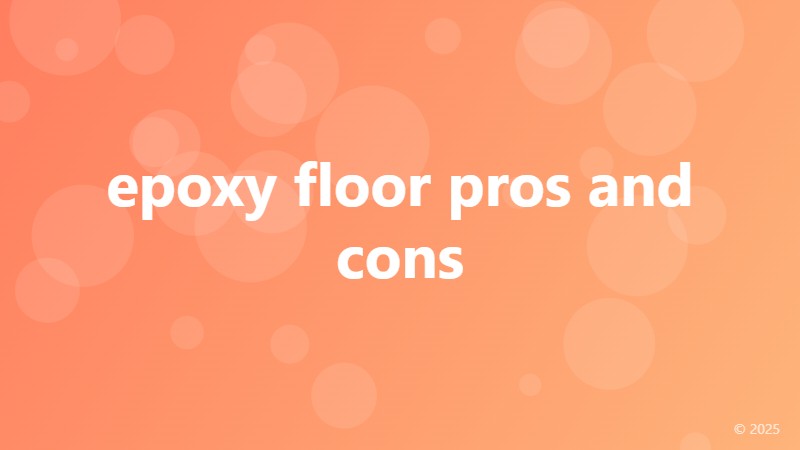epoxy floor pros and cons
 ```html
```html
Epoxy Floor Pros: Why You Might Love Them
Epoxy floors have surged in popularity for both residential and commercial applications, and for good reason. Their stunning visual appeal, combined with exceptional durability and low maintenance, makes them a compelling option for various spaces. Let's delve into the significant advantages of choosing an epoxy floor for your home or business.
One of the most prominent pros is their unmatched durability. Epoxy flooring is exceptionally resistant to scratches, stains, and impacts. This makes it ideal for high-traffic areas like garages, workshops, and commercial kitchens where the floor endures constant wear and tear. Say goodbye to chipped paint and unsightly scuff marks – epoxy floors can handle it all.
Easy maintenance is another key benefit. Unlike traditional flooring materials like carpet or wood, epoxy floors require minimal upkeep. A simple sweep or mop is usually sufficient to keep them clean and looking their best. Their non-porous surface prevents the build-up of dirt and bacteria, making them hygienic and easy to sanitize.
Aesthetic versatility is a significant selling point. Epoxy floors come in a wide array of colors, finishes, and designs. From sleek, modern solids to intricate metallic flakes and custom patterns, you can personalize your floor to match your unique style and décor. This allows for creative expression and the ability to seamlessly integrate the flooring into your overall design scheme.
Chemical resistance is crucial in certain environments. Epoxy floors are resistant to a wide range of chemicals, making them ideal for garages, workshops, and industrial settings where spills and exposure to harsh substances are common. This resistance significantly extends the lifespan of the flooring and reduces the risk of damage.
Finally, increased property value is a long-term benefit. Installing epoxy flooring can significantly enhance the curb appeal and overall value of your property. Potential buyers are often drawn to the durability, low-maintenance nature, and aesthetic appeal of epoxy floors, making it a smart investment for homeowners.
Epoxy Floor Cons: Potential Drawbacks to Consider
While epoxy floors offer numerous advantages, it's essential to be aware of potential drawbacks before making a decision. Understanding these cons will help you make an informed choice based on your specific needs and circumstances.
One significant consideration is the initial cost. Epoxy floor installation is typically more expensive than other flooring options like vinyl or carpet. However, the long-term durability and low maintenance costs often offset this initial investment over time.
Professional installation is often necessary for optimal results. While DIY epoxy flooring kits are available, achieving a flawless, professional finish usually requires the expertise of a skilled installer. This adds to the overall cost and requires coordinating schedules.
Surface preparation is crucial. The success of epoxy flooring relies heavily on proper surface preparation. This involves meticulous cleaning, grinding, and priming to ensure a strong bond and prevent issues like peeling or cracking. This step can be time-consuming and labor-intensive.
Repairing damaged areas can be challenging. Unlike some flooring materials, repairing chips or cracks in epoxy floors can be difficult and may require professional intervention. This adds an extra cost consideration if damage occurs.
Limited flexibility is another factor to consider. Epoxy floors are hard and non-flexible, which can be uncomfortable for prolonged periods of standing. This is a key consideration for residential areas like kitchens or bathrooms where comfort is a priority.
Potential for odor during curing is a common concern. Epoxy resins release fumes during the curing process, which can have a strong odor. Proper ventilation is essential to minimize this issue and ensure a safe installation environment.
Epoxy Floor Pros and Cons: The Final Verdict
Ultimately, the decision of whether or not to install epoxy floors depends on your individual needs, budget, and preferences. Weighing the pros and cons carefully will help you determine if epoxy flooring is the right choice for your specific project. The exceptional durability, low maintenance, and aesthetic versatility make it a compelling option for many, but the initial cost and the need for professional installation are important factors to consider.
Remember to thoroughly research different epoxy flooring options and obtain multiple quotes from reputable installers to ensure you make the best decision for your home or business.
```